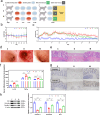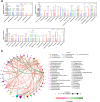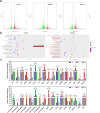Mesenchymal stem cells: a novel therapeutic approach for feline inflammatory bowel disease
- PMID: 39522034
- PMCID: PMC11550560
- DOI: 10.1186/s13287-024-04038-y
Mesenchymal stem cells: a novel therapeutic approach for feline inflammatory bowel disease
Abstract
Background: Inflammatory bowel disease (IBD) poses a significant and growing global health challenge, affecting both humans and domestic cats. Research on feline IBD has not kept pace with its widespread prevalence in human populations. This study aimed to develop a model of feline IBD by incorporating dextran sulfate sodium (DSS) to evaluate the therapeutic potential of MSCs and to elucidate the mechanisms that enhance their action.
Methods: We conducted a comprehensive clinical assessment, including magnetic resonance imaging (MRI), endoscopy, and histopathological examination. Additionally, alterations in intestinal microbiota were characterized by 16 S rDNA sequencing, and the influence of MSCs on IBD-related gene expression was investigated through transcriptome analysis.
Results: According to our findings, MSC treatment significantly mitigated DSS-induced clinical manifestations, reduced inflammatory cell infiltration, decreased the production of inflammatory mediators, and promoted mucosal repair. Regarding the intestinal microbiota, MSC intervention effectively corrected the DSS-induced dysbiosis, increasing the presence of beneficial bacteria and suppressing the proliferation of harmful bacteria. Transcriptome analysis revealed the ability of MSCs to modulate various inflammatory and immune-related signaling pathways, including cytokine-cytokine receptor interactions, TLR signaling pathways, and NF-κB pathways.
Conclusion: The collective findings indicate that MSCs exert multifaceted therapeutic effects on IBD, including the regulation of intestinal microbiota balance, suppression of inflammatory responses, enhancement of intestinal barrier repair, and modulation of immune responses. These insights provide a solid scientific foundation for employing MSCs as an innovative therapeutic strategy for IBD and pave the way for future clinical explorations.
Keywords: Cat model; Inflammatory bowel disease; Intestinal microbiota; Mesenchymal stem cells (MSCs).
© 2024. The Author(s).
Conflict of interest statement
Not applicable
Figures







Similar articles
-
Impact of Mesenchymal Stem Cells on the Gut Microbiota and Microbiota Associated Functions in Inflammatory Bowel Disease: A Systematic Review of Preclinical Evidence on Animal Models.Curr Stem Cell Res Ther. 2024;19(7):981-992. doi: 10.2174/011574888X250413230920051715. Curr Stem Cell Res Ther. 2024. PMID: 37817517
-
A novel therapeutic approach for inflammatory bowel disease by exosomes derived from human umbilical cord mesenchymal stem cells to repair intestinal barrier via TSG-6.Stem Cell Res Ther. 2021 May 29;12(1):315. doi: 10.1186/s13287-021-02404-8. Stem Cell Res Ther. 2021. PMID: 34051868 Free PMC article.
-
Human umbilical cord mesenchymal stem cells alleviate inflammatory bowel disease by inhibiting ERK phosphorylation in neutrophils.Inflammopharmacology. 2020 Apr;28(2):603-616. doi: 10.1007/s10787-019-00683-5. Epub 2020 Jan 14. Inflammopharmacology. 2020. PMID: 31938969
-
Intercellular adhesion molecule-1 enhances the therapeutic effects of MSCs in a dextran sulfate sodium-induced colitis models by promoting MSCs homing to murine colons and spleens.Stem Cell Res Ther. 2019 Aug 23;10(1):267. doi: 10.1186/s13287-019-1384-9. Stem Cell Res Ther. 2019. PMID: 31443680 Free PMC article.
-
"Remodeling the intestinal immune microenvironment": immune regulation and tissue regeneration by mesenchymal stem/stromal cells in the repair microenvironment of inflammatory bowel disease.Front Immunol. 2025 May 13;16:1543702. doi: 10.3389/fimmu.2025.1543702. eCollection 2025. Front Immunol. 2025. PMID: 40433382 Free PMC article. Review.
Cited by
-
Case Report: Allogeneic adipose-derived mesenchymal stem cells for severe feline chronic kidney disease.Front Vet Sci. 2025 Jul 23;12:1632324. doi: 10.3389/fvets.2025.1632324. eCollection 2025. Front Vet Sci. 2025. PMID: 40771954 Free PMC article.
-
Mesenchymal Stem Cells in Veterinary Medicine-Still Untapped Potential.Animals (Basel). 2025 Apr 19;15(8):1175. doi: 10.3390/ani15081175. Animals (Basel). 2025. PMID: 40282009 Free PMC article. Review.
References
-
- Baumgart DC, Carding SR. Inflammatory bowel disease: cause and immunobiology. Lancet. 2007;369:1627–40. - PubMed
-
- Powell DW, Mifflin RC, Valentich JD, Crowe SE, Saada JI, West AB. Myofibroblasts. I. Paracrine cells important in health and disease. Am J Physiol. 1999;277:C1–9. - PubMed
-
- Bouma G, Strober W. The immunological and genetic basis of inflammatory bowel disease. Nat Rev Immunol. 2003;3:521–33. - PubMed
MeSH terms
Substances
LinkOut - more resources
Full Text Sources
Miscellaneous

